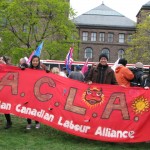Once again the temporary foreign worker program has erupted in controversy where it is being used to pit workers against each other.
News reports point out that the Royal Bank of Canada has decided to move its information technology department abroad. To do so, it has brought in temporary workers from India that will learn the ropes from their Canadian counterparts. Following this training, the Canadian workers will be laid off, and the Indian workers will transition the IT department to India and return there.
This is not a story of so-called “foreign” workers coming to replace “Canadians”. It is a story of broken immigration laws where workers can be brought in to do short-term dirty work that no one else wants to do and can then be removed at the whim of the employers.
Many facts are yet unknown: how much are the migrant workers being paid? Did they have to pay fees to get these jobs? Were they promised citizenship? Will they be able to get basic services while here? All this needs to be determined.
What we do know is that 45 bank workers are being laid off to be replaced temporarily by migrant workers. This sort of ruthless denial of work to everyday people is deplorable and not surprising.
The Canada Centre for Policy Alternatives believes that Federal government layoffs of public servants will result in nearly 70,000 job losses by 2014-15. This past March, Canada lost over 54,000 net jobs because of Conservative policies. Getting rid of workers is what the Tories do best.
At the same time, Employment Insurance has been cut so that people are forced to go back to work sooner, at lower wages, and further away from their homes. Add to this mix a free-for-all season on migrant workers whose labour and immigration rights are being trampled upon and we have the perfect recipe for the downward spiral of wages.
Responding to any one of these concerns will result in incorrect solutions. The answer cannot be banning migrant workers from entering Canada.
We must emphasize an expansive, robust and inclusive immigration framework with full citizenship rights and benefits for migrants coming to work in this country. This must be done with corresponding labour reforms that protect the rights of all workers — migrants and Canadians. Doing so will mean an upward push on wages, and the ability for more people to safely fight and organize against the Harper agenda.…
Read More+
